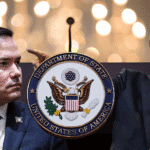Tensions between the United States and several African nations deepened last week after General Michael E. Langley, Commander of the United States Africa Command (AFRICOM), accused Captain Ibrahim Traoré, Burkina Faso’s military leader, of diverting the country’s gold reserves to support his regime rather than uplifting the lives of its citizens. The controversial remarks, made during a hearing before the U.S. Senate Armed Services Committee, have sparked fierce responses across Africa, highlighting once more the complex legacy of foreign involvement in African governance—and raising fresh questions about the role of African-American leadership within Western power structures.
Burkina Faso: A Nation Shaped by Struggle
To understand the magnitude of these comments, one must first grasp the context in which they landed. Burkina Faso, a landlocked nation in West Africa, has long struggled under the weight of colonial legacies, political instability, and economic marginalisation. Once known as Upper Volta, the country gained independence from France in 1960. The newly formed republic quickly fell into cycles of coups and fragile civilian rule, reflecting deeper tensions within the post-colonial order.
But for many Burkinabè, the most enduring symbol of their national pride remains Thomas Sankara. Dubbed “Africa’s Che Guevara,” Sankara seized power in 1983 at just 33 years old and swiftly implemented radical reforms aimed at ending corruption, eradicating hunger, and asserting Burkina Faso’s sovereignty. He renamed the country from Upper Volta to Burkina Faso—meaning “Land of Upright People”—and nationalised land, invested in education and healthcare, and demanded an end to foreign dependence.
Sankara’s vision was short-lived. He was assassinated in 1987 during a coup led by his close ally Blaise Compaoré, who would go on to rule the country for 27 years with strong support from Western allies and economic institutions. Under Compaoré, foreign mining companies—mostly from Canada, Australia, and the West—gained extensive access to Burkina Faso’s gold reserves, often at the expense of local communities and environmental protections.
It is within this long-standing context of resource exploitation, foreign interference, and calls for national self-determination that Ibrahim Traoré emerged in 2022, following a coup against Lieutenant Colonel Paul-Henri Damiba. Like Sankara before him, Traoré projected an image of a patriotic revolutionary aiming to restore control over the nation’s wealth. His leadership has drawn praise from those tired of external control—but criticism from those who accuse him of authoritarian tactics.
General Langley: A Historic Rise, a Controversial Role
General Michael E. Langley, the man behind the recent AFRICOM statement, holds a story equally steeped in symbolism and significance. In August 2022, Langley became the first Black four-star general in the 246-year history of the United States Marine Corps—a landmark moment in a military institution that has long struggled with racial representation at the highest levels.
Born in Shreveport, Louisiana, Langley is the son of a U.S. Air Force veteran. He graduated from the University of Texas at Arlington and later earned a master’s degree in National Security Strategic Studies from the U.S. Naval War College. His military career spans nearly four decades, with deployments across Asia, the Middle East, and Africa. Prior to leading AFRICOM, Langley commanded U.S. Marine Forces Europe and Africa.
Langley’s ascent to the top of AFRICOM came at a time when the U.S. military was reevaluating its footprint on the African continent. Amid growing Chinese and Russian influence, particularly in mineral-rich regions, the U.S. has sought to reassert its strategic relevance. Under Langley’s leadership, AFRICOM has intensified its focus on counter-terrorism and regional stability, while critics argue that it increasingly resembles a tool for safeguarding Western economic interests.
The contradiction is difficult to ignore: a Black American general representing a military superpower, now engaged in public disputes with African leaders over sovereignty, resources, and self-rule. For many in Africa, the optics are jarring.
“Appointing someone who looks like us doesn’t make the policies any less colonial,” said a political analyst in Ouagadougou. “It’s worse, because it masks the same old playbook behind a new face.”
Gold, Geopolitics, and Accusations
During the Senate hearing, Langley claimed that Traoré was diverting Burkina Faso’s gold revenues to finance the military-led regime rather than channelling it into development projects. While he did not provide direct evidence, the statement has had cascading political consequences. The Burkinabè government condemned the accusation, calling it “gravely inaccurate” and an insult to a nation struggling to assert its independence.
South Africa’s Economic Freedom Fighters (EFF) party, a frequent critic of Western foreign policy in Africa, responded with characteristic bluntness. “This is another example of U.S. imperialism cloaked in concern,” the party said in a statement. “Africa must stand united against these intimidation tactics designed to destabilise any government that refuses to bow to Washington.”
At the heart of the dispute is the control of gold—a resource that accounts for more than 70% of Burkina Faso’s export revenues. Recent moves by Traoré to renegotiate mining contracts and increase state involvement in gold production have rattled multinational corporations and drawn warnings from financial institutions. In February, the government announced it was creating a new state-controlled mining company to oversee future operations—a move seen by some as a return to resource nationalism reminiscent of the Sankara era.
Echoes of the Past, Warnings for the Future
The friction between Langley and Traoré is emblematic of a much larger battle for Africa’s future. As nations like Burkina Faso seek to assert greater control over their resources and redefine their international partnerships—often turning toward Russia, China, and the Gulf—Western powers are facing a crisis of relevance.
The U.S., long reliant on a mix of military partnerships, development aid, and soft power diplomacy, finds its influence waning in parts of the continent. AFRICOM, originally established in 2007 under President George W. Bush, was meant to be a platform for cooperation. Today, however, it is increasingly viewed with suspicion, particularly in countries where regime changes have occurred and foreign troops were previously stationed.
The situation is complicated by the rise of Russian influence through the Wagner Group, which has expanded its presence in the Sahel, including in Burkina Faso. Traoré’s perceived alignment with Moscow is seen by some as a counterweight to what they view as a decades-long Western stranglehold on policy and wealth.
An Unfolding Story
While there is no indication that General Langley is directly involved in plotting against Traoré or his administration, the general’s comments have amplified fears that the U.S. is preparing to escalate pressure on the Burkinabè government—whether through sanctions, intelligence operations, or indirect support for regime change.
And yet, for all the fire and fury, this crisis also offers a unique lens through which to view the evolving relationship between Africa and the West. Gone are the days when African nations would silently accept lectures from Washington. Today, leaders and movements across the continent are demanding to be heard on their own terms.
Whether Traoré is ultimately judged as a reformer or an autocrat, the broader issue remains: who gets to control Africa’s resources, shape its future, and speak for its people?
As General Langley’s career advances, and as Burkina Faso’s internal battles continue, both men now stand at the intersection of history, geopolitics, and identity. Their clash is not merely about gold, but about power—and the new, unfolding map of Africa’s future.
General vs. Captain: The New Colonial Optics of African Sovereignty

Dean Mikkelsen is a freelance writer and contributor at The Washington Eye, specialising in geopolitics, energy, and security. With over two decades of editorial experience across the Middle East and the United States, he offers nuanced analysis shaped by both on-the-ground reporting and strategic insight.
Dean’s work spans a range of publications, including Oil & Gas Middle East, Utilities Middle East, and Defence & Security Middle East, where he covers topics from energy transitions to maritime threats. He has also contributed to titles such as The Energy Report Middle East and MENA Daily Chronicle, providing in-depth coverage on regional developments.
In addition to his writing, Dean has been featured as an expert commentator on platforms such as BBC Persia and ABC News Australia, and has been quoted in The National and Arabian Business.
An engineer by training, Dean combines technical knowledge with journalistic rigour to explore the intersections of diplomacy, defence, and trade in a complex global landscape.











